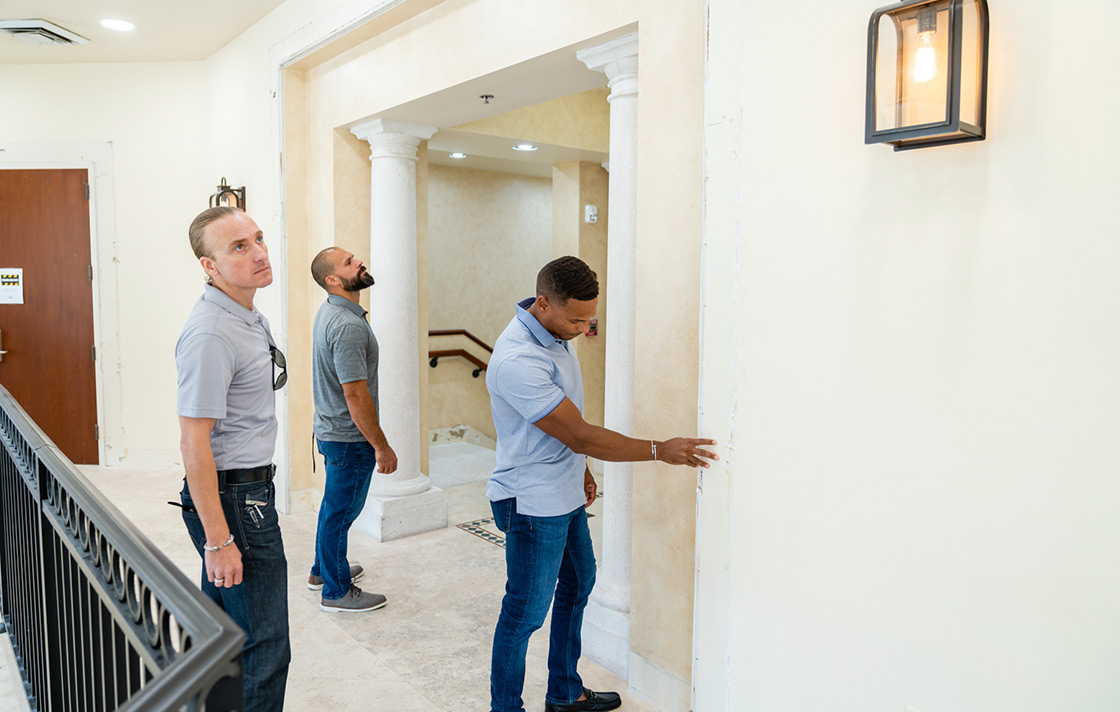Florida Property Turnover & Condition Assessment Services
Safeguard your families and investments with comprehensive milestone inspection services.
Safeguard your community’s investments and ensure a smooth transition of ownership with our comprehensive Property Turnover and Condition Assessment services. Serving Palm Beach, Broward, and Miami-Dade counties, Building Mavens offers expert evaluations that meet Florida’s strict regulations and provide peace of mind for developers, condominium associations, HOAs, and property owners. Our licensed engineers bring deep local expertise in South Florida’s climate challenges, regulatory knowledge of Florida statutes, and an unwavering commitment to quality and safety.
Turnover vs. Condition Assessments
Developer Turnover Inspection Reports (Transition Studies)
In Florida’s condominium communities, developer turnover marks the moment when control of the association passes from the developer to the owners. Florida law (Chapter 718, Florida Statutes) requires that when a certain percentage of units have been sold to non-developer owners, the developer must hand over governance of the association to the residents. As part of this turnover process, the developer is obligated to provide a Turnover Inspection Report prepared and certified by a Florida Registered Architect or Professional Engineer. This Developer Turnover Report documents the condition of all key common elements at the time of transition – outlining required maintenance, estimated useful life of components, and replacement costs for crucial systems. Common elements reviewed include the roof, structural components (e.g. load-bearing walls, foundations), fire protection systems, elevators, HVAC, plumbing, electrical systems, parking areas, drainage, swimming pools, seawalls, and more.
It’s important to note that a developer’s Turnover Inspection Report is distinct from any report an association might commission for construction defects claims under Chapter 558, Florida Statutes. The turnover report provided by the developer is a general condition attestation required by law, whereas a 558-related report (often called a Property Turnover Report by the association) is an independent engineering assessment that identifies specific construction defects for potential claims. Both types of reports must be prepared by licensed engineers or architects, but the focus differs: the developer’s report ensures required documents and maintenance information are handed over, while a Chapter 558 defects report pinpoints issues for repair or legal remedy.
Property Condition Assessments (PCA)
Aside from condominium turnover obligations, Building Mavens also conducts Property Condition Assessments, also known as due diligence inspections or Facility Condition Assessments (FCA). A PCA is a thorough evaluation of a property’s overall physical condition, typically performed when a property is being bought, sold, or re-financed, or simply for long-term planning by an owner. Our team performs a comprehensive visual inspection of all major building systems and site improvements to identify any deficiencies that could affect safety, functionality, or value. We adhere to industry best practices such as ASTM E2018-99 – Standard Guide for Property Condition Assessments, ensuring nothing is overlooked. By examining structural components, building envelope, HVAC, plumbing, electrical, and life-safety systems, we deliver an objective report on the current condition of the asset and any deferred maintenance or capital improvements that may be needed.

For owners and investors, a PCA report serves as a roadmap for future repairs and expenditures, helping avoid unexpected costs. Buyers can use it to negotiate deals or plan renovations, while sellers and managers gain a clear picture of the property’s status to address issues proactively. Even if you’re not in a transaction, periodic facility condition assessments (every 3-5 years is recommended) can guide capital reserve planning and preventive maintenance. Whether it’s a condominium, commercial building, or HOA property, our condition assessments ensure you’re fully informed about the building’s health before making critical decisions.
“Building Mavens has been integral in helping us be on the right track to comply and I know that through the end of our project, they will still be there until we have our final inspection. Their price was reasonable and their service and guidance exceeded expectations. We would use them again should/when further inspections are required.”
- Mari K., Manager of Sheridan by the Beach
Our Inspection Process & Deliverables
Thorough On-Site Examination
Building Mavens’ Property Turnover and Condition Assessments begin with an on-site inspection performed by our licensed engineers. Depending on the service, we tailor our scope to meet your needs, whether a Developer Turnover Inspection for a new condo, or a Property Condition Assessment for an existing building or portfolio. In every case, we follow a systematic process covering all major building components and common elements. This includes:
- Structural Elements: Evaluation of the foundation, load-bearing walls, columns, beams, slabs, balconies, and other structural components for signs of distress or defects (e.g. cracks, spalling, settlement).
- Exterior Envelope: Inspection of roofs, façades, windows, doors, and waterproofing systems. We look for leaks, deteriorated sealants, roofing failures, paint condition, and anything affecting weather resistance.
- Mechanical, Electrical & Plumbing (MEP) Systems: Assessment of HVAC equipment, electrical panels and wiring, plumbing lines, water heaters, fire protection and life safety systems. We verify operational status, maintenance issues, code compliance, and estimate remaining useful life of critical MEP components.
- Amenities and Site Features: Examination of elevators, parking garages or lots, driveways, drainage and irrigation, swimming pools or spas, seawalls, and other amenities as applicable. No element is left unchecked, from the top of the roof down to the building’s drainage outfalls.
If substantial deterioration is suspected, the process may move on to a standard Phase One inspection to a Phase Two inspection, which involves a more comprehensive examination to determine the extent of the issue and specify necessary repairs.
Throughout the inspection process, our experts document conditions with high-resolution photographs and detailed field notes. We also review available documentation (construction plans, maintenance records, prior reports) to inform our assessment. If construction defects are suspected, we note their locations and nature, and can suggest advanced diagnostics or testing if needed (such as infrared thermography or material testing). Our team brings a forensic mindset to pinpoint issues that could impact safety, performance, or value.
Comprehensive Reporting
After the field work, Building Mavens compiles all findings into a comprehensive written report. For a Developer Turnover Inspection Report, we ensure it meets Florida Statute 718.301 requirements by identifying each common element, its condition, required maintenance, estimated useful life, and estimated replacement cost. This report serves as an official record attesting to the property’s condition at turnover and is signed and sealed by our engineer, ready for submission to the association’s board.
For Property Condition Assessment reports, we provide a thorough narrative of the property’s current condition, typically organized by building system (site, structural, exterior, roof, interior, mechanical, electrical, plumbing, etc.). Each section describes observed deficiencies or deferred maintenance issues, accompanied by photos. Central to these reports, we include recommendations for repairs or further investigation for any significant issues found. We also provide a Replacement Reserve Table forecasting the anticipated timeline and budget for major repairs or component replacements over the coming years, an invaluable tool for capital planning and financial due diligence. All our reports follow industry standards (ASTM E2018-99 for PCA) and are presented in a clear, professional format that stakeholders and even laypersons can understand.
Quality Assurance & Fast Turnaround
Building Mavens recognizes that timing can be everything. A condominium turnover meeting or a closing date may be pending and you need a report done as soon as possible. We commit to efficient turnaround times without sacrificing quality. A typical condominium turnover inspection can be completed in a few days on-site, with the final report delivered within a couple of weeks thereafter, depending on property size and complexity. We coordinate scheduling to meet your deadlines whenever possible. Before any report goes out, it undergoes a rigorous internal review by senior engineers to ensure accuracy and completeness. Our reputation rests on providing reliable, factual results, so we take care to get it right the first time. With Building Mavens, you can trust that the findings and guidance we deliver are objective, substantiated, and actionable, empowering you to make informed decisions about your property.

Why Choose Building Mavens?
Schedule Your Assessment
Choosing Building Mavens for your Property Turnover Inspection or Property Condition Assessment means partnering with a South Florida team that values safety, integrity, and client satisfaction above all. We are passionate about helping our clients navigate the technical and regulatory complexities of building ownership transitions. Whether you are a developer preparing for turnover, a condo association or HOA seeking an independent assessment to hold a developer accountable, or an investor evaluating a property’s condition, we are here to bring clarity and transparency every step of the way.
Ready to get started? Don’t wait until small issues become big problems. Proactively managing the turnover process and understanding your building’s condition can save you from costly surprises down the road. Contact Building Mavens today to schedule a consultation or to book your Property Turnover/Condition Assessment. Our experts will discuss your specific needs, provide a transparent quote, and arrange a convenient time for the inspection. We’ll also answer any questions you have about the process, licensing, or what to expect. Let us put our experience to work for you, ensuring a seamless transition and a strong foundation for your property’s future.
Frequently Asked Questions
Developer Turnover is the transfer of control of residential associations from developers to homeowners. In Florida, this process is regulated for Condominiums by statute 718.301 – transfer of association control; claims of defect by association. The statute requires developers to turn over control of the board of directors to homeowners when a certain threshold of units within a condominium has been sold to non-developer homeowners. Moreover, developers are required to provide associations with specific documents and reports, including an engineering report. The engineering report is a critical document that identifies and attests to the required maintenance, useful life, and replacement costs of specific applicable common elements, based on an inspection by a Florida Registered Architect or Florida licensed Professional Engineer.
Unlike the Developer Turnover Report required by Florida Statute 718, the condominium owner’s Association (COA) may choose to perform their own evaluation of the property and produce a report identifying alleged construction defects for a claim pursuant to Florida Statute 558 (Chapter 558 Construction Defects). Like the Turnover Inspection Report, the report must be prepared by a Florida Registered Architect or Florida licensed Professional Engineer. Unlike the Turnover Inspection Report, the Property Turnover Report identifies the location of the alleged defects, explains the issue and potential impact, and provides a recommendation for either further investigation or repair.
A property turnover assessment evaluates a building’s condition before it changes ownership or management, identifying needed repairs or maintenance. This ensures the new owner or manager is fully informed about the property’s state and any issues or repairs required, potentially avoiding disputes and ensuring the property’s value is accurately represented.
A typical condition assessment involves a detailed inspection of the building’s structure, systems (like HVAC, fire, electrical, and plumbing), and exterior elements to document current conditions and recommend maintenance or repairs.
We provide a detailed report with findings that identify and attest to the required maintenance, useful life, and replacement costs of the applicable Condominium common elements. This includes photographs, descriptions of conditions, and recommendations for repairs or improvements.
We recommend conducting regular assessments every 3-5 years to ensure ongoing maintenance needs are identified and addressed, protecting the property’s value and safety. This is especially crucial before a turnover or major financial decision regarding the property.
Yes, by identifying maintenance needs early, you can avoid more costly repairs later and extend the lifespan of building components.
Use the assessment report to prioritize and plan maintenance or renovation projects, ensuring you address the most critical needs first to maintain building safety and value.
The time required varies based on the property’s size and complexity, but assessments typically take several days to a few weeks to complete.
A property turnover and condition assessment should be conducted by a licensed professional or firm with a strong background in building inspections and engineering assessments. This ensures they have the requisite expertise and experience tailored to your property type, such as commercial buildings or condominiums. Ideal candidates will hold relevant licenses for conducting building inspections in Florida, including from the Florida Board of Professional Engineers, and possess certifications from recognized industry organizations. This expertise should be complemented by extensive experience, particularly with properties in the local region, understanding of structural engineering, building systems, and safety standards, which are essential for a comprehensive evaluation.
The assessor’s professionalism and reliability are marked by his or her ability to provide detailed, understandable reports that include findings, photographs, and actionable recommendations, alongside a willingness to discuss these outcomes. The assessor’s utilization of the latest technologies, such as infrared thermography and drone inspections, indicates a commitment to thorough and efficient assessments. References and positive reviews from past clients with similar properties can also offer insights into the firm’s thoroughness and professionalism, helping you make an informed choice for your property turnover and condition assessment needs.
Moreover, ensuring that these professionals carry appropriate liability and professional indemnity insurance is key to protecting your interests.
Contact us through our website or call directly. We’ll discuss your needs and arrange a convenient time for the assessment.



